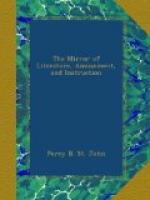The place where the commons of Great Britain, now hold their assemblies, was built by king Stephen, and dedicated to his namesake the proto-martyr. It was beautifully rebuilt by Edward III. in 1347, and by him made a collegiate church, and a dean and twelve secular priests appointed. Soon after its surrender to Edward VI. it was applied to its present use. The revenues at that period were not less than L1,085 a year.
When the royal assent (says de Lolme) is given to a public bill, the clerk says, le Roy le veut. If the bill be a private one, he says, soit fait comme il est desire. If the bill has subsidies for its objects, he says, le Roy remercie ses loyaux sujets, accepte leur benevolence ainsi le veut. Lastly, if the King does not think proper to assent to the bill, the clerk says, le Roy s’en avisera; which is a mild way of giving a refusal. This custom was introduced at the conquest, and has been continued, like other matters of form, which sometimes exist for ages after the real substance of things has been altered; and judge Blackstone expresses himself on this subject in the following words:—“A badge, it must be owned, (now the only one remaining) of conquest; and which one would wish to see fall into total oblivion, unless it be reserved as a solemn memento to remind us that our liberties are mortal, having once been destroyed by a foreign power.” (De Lolme.) Under the walls of the legal parliament, there is held an illegal parliament, composed of livery men, who assemble in the members’ servants waiting-room. Every year, a speaker or chairman is chosen, and each member addresses the other by the title his master bears. In case of disputes, &c., the speaker (who sits in an elevated chair) decides, and if there is any unparliamentary conduct, the party is fined.
This ground parliament has powers peculiar to itself, and never interferes with the upper parliament under the same roof, its powers not being so great as the “Senatus populusque Romanus.” It is an annual parliament, but does not extend to universal suffrage. The members vacate their seats or stands, when discharged by their masters in the upper, or legal parliament. This parliament prints no journals, its acts not extending beyond the room, except when the Irish members turn out in palace yard. N.B. No member can be admitted till the fees are paid. For further information relating to this self-elected parliament, see the rules and regulations over the mantelpiece in the room.
P.T.W.
* * * * *
FINE ARTS.
* * * * *
THE COLOSSEUM.
(For the Mirror.)
The legitimate name of Mr. Hornor’s colossal edifice in the Regent’s Park, we believe, was first set forth as the Gyrorama, Girorama, Panopticon, or General View. The Catholic Church of Berlin, although diminutive in proportion to the Marylebone wonder, is, with the solitary exception of the Pantheon at Rome, the only structure, perhaps, that bears any resemblance to it in form and feature.




